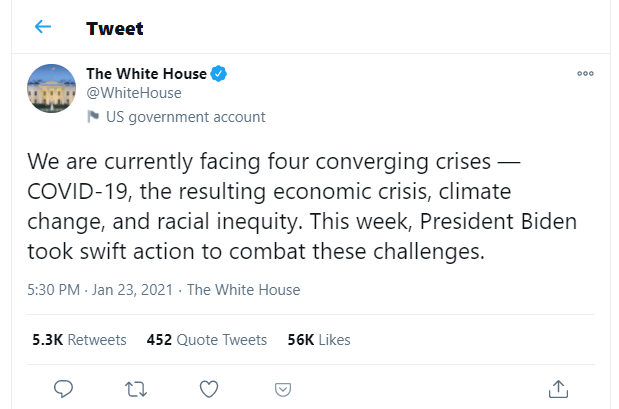How companies can best prepare for COP26
Stephanie Bailey, senior partner, managing director of corporate and head of COP26 unit
For a long time, there has been no hope.
But it was clear from day one of the Biden administration that one of the world’s biggest economies was now prepared to re-engage with the climate issue.
As we move towards November 2021 and the 26th UN Conference of the Parties (COP26), we can see the glimmer of something more positive.
Like any crisis, the climate emergency needs action rather than words. It is a time for politicians, policymakers, businesses and multilateral organisations to come together and be selfless as they look to find solutions for the world’s biggest problem.
And the expectation has never been as high.
We have never needed anything as much as this.
The world needs concerted action on the environmental crisis and the UK needs to show that it can lead on global issues.
I believe that this event will succeed in taking forward some of the promises of CO21 and accelerating the Race to Zero.
But it will not be without its challenges.
There will be little tolerance for anything that is seen as self-serving.
Greenwashing will also be quickly exposed. Instead, there is a need for more innovative thinking.
We’re at an inflexion point and COP26 will galvanise a desire for action like we have never seen before.
So how can companies leverage the COP26 summit?
For those that prepare for COP26, there will be many opportunities.
This event should not be something that is feared.
An acknowledgement of the journey that needs to be taken and an honest approach to what needs to be done will be more welcomed than grandiose vacuous corporate speak.
1. Start with your internal audiences
One of the biggest impacts of COVID-19 has been to reinforce the importance of company culture when dealing with its position on any issue and the same is true for the climate emergency.
Big bold statements only ring true if you have your own house in order so the first thing to do is to ensure that you have addressed internal environmental strategy before you look at communicating externally.
Most employees expect their company to have a position on the environment so creating environment ambassadors and bringing them along on the journey will enable you to tell a more credible message.
2. Communicate early
Starting now is crucial to create the maximum impact and build a credible story with your audiences.
Building a plan that looks at the narrative you aim to tell at COP26, Glasgow and then working backwards gives you the time to get the right parts in place.
There are clear themes to the event so the first part will be understanding what aspects the company can credibly talk to whether it be the transition to clean energy, clean transport, nature-based solutions, adaptation and resilience or finance.
3. Empower your leaders to take a stand
According to recent research by TRUE Global Intelligence, FleishmanHillard’s in-house research practice, 59% of those surveyed expect companies to take a stand on climate and environmental issues, up from 39% on the previous year.
The focus on COP26 this year means that companies should prepare their leaders to answer questions on their own role both internally and externally.
Just as we have seen companies having to respond to issues of diversity, equality and inclusion, they will need to also have a position on the environment, particularly if the leadership or the brand have a prominent external profile.
4. Create the right alliances
Whilst the last few years have reinforced polarisation, there will now be a greater focus on collaborative action and the reality is that no company can or should have to do everything alone.
Credibility will be gained by the right conversations and industry alliances with those that can help your company on its Race to Zero.
There will be those that can make significant wholescale changes, but even if that is not where your business currently is you can still take small steps which collectively can be part of a bigger change.
5. Deal in facts and progress, not lofty targets
Whilst the Paris Agreement gave the world a road map to change, for many the targets were too distant to make the difference we desperately now need.
Those that want to make an impact will be the ones that appreciate and act on the need for more immediate change with tangible, transparent targets that can be tracked and updated.
So for me, COP26 does not start and end in November.
Those that will most benefit from the opportunities that are created are those that prepare for this now and look at ways they can build their story to be part of an event that is set to be game-changing.
Speak to us about getting ready for COP26. Email: [email protected]
Find Out More
-
Platinum CMS Award
March 13, 2024
-
Changing Communications Tack at Mobile World Congress
February 21, 2024



